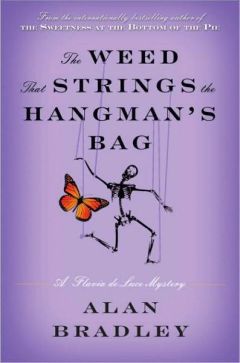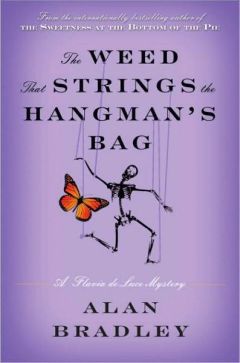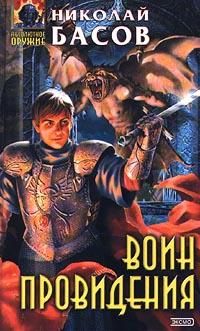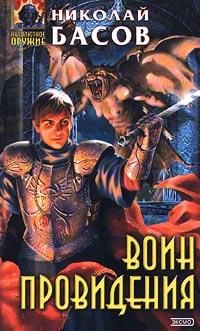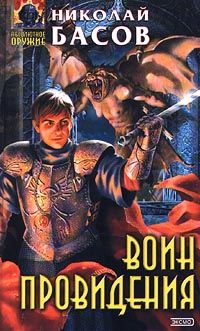Alan Bradley - A Red Herring Without Mustard: A Flavia de Luce Novel
My immediate reaction was to shrink back—to step away from the glass—but I found that I could not. Some remote part of my mind had already spotted a detail that was only now leaking slowly into my consciousness, and I’m afraid I let out a gasp.
The objects gripped in the hands of the bulldog man were Harriet’s firedogs—Sally Fox and Shoppo!
EIGHTEEN
“WHAT IS IT?” THE woman asked. Her voice seemed to be coming from a very great distance.
“It’s—it’s—”
“Yes, dear … what is it?”
It was the “dear” that brought me snapping back. A “dear” or “dearie” to me is about as welcome as a bullet to the brain. I’ve had places reserved in the ha’penny seats of Hell for people who address me in this way.
But I bit my tongue.
“It’s—just that you have such a smashing view from your window,” I said. “The river … Malplaquet Farm … all the way to East Finching and the hills beyond. One would never suspect, walking in the high street, that such a—”
There was a floor-shaking crash from downstairs as some heavy object was dropped. A couple of muffled curses came drifting up through the floorboards.
“Reginald!” the woman shouted, and there was an awkward silence in the depths.
“Men!” she said, loudly enough to make herself heard downstairs. “Windmills on legs.”
“I think I’d better go,” I said. “They’ll be expecting me at home.”
“Very well, dear,” she said. “Run along, then. And don’t forget about those letters. You may bring them whenever you’re able.”
I did not tell her what I was thinking, but rather, gave a very small mock curtsy, then turned and made my way down the narrow stairs.
At the bottom, I glanced towards the back of the shop. Reginald Pettibone and the owner of the van stood staring at me from the shadows. Neither of them moved or spoke, but I knew, in the way we females are supposed to know, that they had been talking about me.
I turned my back on them and walked to the door, stopping only to write my initials casually in the dust that covered an ebony sideboard. I wasn’t exactly afraid, but I knew how an animal trainer in a steel cage must feel when, for the first time, he turns his back on the fierce gaze of a pair of new tigers.
Although she didn’t say so, Gladys seemed happy to see me. I had parked her against a tree across the high street from Pettibone’s shop.
“There’s dirty work at the crossroads,” I told her. “I can feel it in my bones.”
I needed to get home at once to inspect the drawing-room hearth.
The trees were making late afternoon shadows as I cycled through the Mulford Gates and up the avenue of chestnuts. I’d soon be expected to put in an appearance at the dinner table, and I wasn’t looking forward to it.
As I opened the kitchen door, the sound of a Schubert sonata came floating to my ears.
Success! I knew instantly that my psychic booby trap had been sprung.
Feely always played Schubert when she was upset, and the opening of the Piano Sonata in B Flat Major when she was especially distraught.
I could almost follow her thoughts as the piano’s notes went flying past my ears like birds from a forest fire. At first there was the tightly controlled anger, with threats of rolling thunder (how I loved the thunder!), but when the full storm broke, Feely’s fierce talent could still make me gasp with admiration.
I edged closer to the drawing room, the better to hear this remarkable outpouring of emotion. It was almost as good as reading her diary.
I had to be careful, though, that she didn’t catch sight of me until dinner, when Father would be there to save my hide. If Feely so much as suspected that I was responsible for the spirit message on her mirror, there would be buckets of blood on the carpet and entrails dangling from the chandeliers.
The drawing room would have to wait.
I did not realize how tired I had suddenly become until I was dragging myself up the stairs. It had been a long day, and it was far from over.
Perhaps, I thought, I would have a nap.
As I approached my laboratory, I came to an abrupt halt. The door was standing open!
I peered round the corner, and there stood Porcelain, still wearing Fenella’s black dress, toasting a slice of bread over a Bunsen burner. I could hardly believe my eyes!
“Cheer-oh,” she said, looking up. “Would you like some toast?”
As if she hadn’t just recently accused me of bashing in her grandmother’s brains.
“How did you get in?”
“I used your key,” she said, pointing. It was still inserted in the lock. “I watched you hide it in the hollow bedpost.”
It was true. I had long before discovered Uncle Tar’s secret hiding place for keys and other things he wanted to keep to himself. My bedroom had once been his, and over time all, or most, of its secrets had been revealed.
“You’ve got your bloody nerve,” I said. The thought of someone invading my laboratory made my skin crawl, as if an army of red ants were swarming up my arms, fanning out across my shoulders, and up the back of my neck.
“I’m sorry, Flavia,” she said. “I know it wasn’t you that attacked Fenella. I can’t have been thinking straight. I was confused. I was tired. I came back to apologize.”
“Then you’d better get at it,” I said.
I was not going to be mollified—wasn’t that the term Daffy had used when she’d said the same thing to me: “mollified”?—with just a couple of token words. There are times when “I’m sorry” is simply not enough.
“I’m sorry,” she said. “I really am. It’s all so upsetting. It’s just too much.”
Suddenly she was in tears.
“First there was Fenella—now they won’t let me see her, you know. They’ve got a constable in a chair watching the door to her room. Then there was that awful business of the man we found hanging from the fountain—”
“Brookie Harewood,” I said. I’d almost forgotten about Brookie.
“And now this latest body they’ve dug up in—what do you call it?—the Palings.”
“What?”
Another body? In the Palings?
“It’s all too much,” she said, wiping her nose on her forearm. “I’m going back to London.”
Before I could say another word, she dug into her pocket and pulled out a five-pound note.
“Here,” she said, prying open my fingers and pressing them closed upon the banknote. “That’s to feed Gry until Fenella’s discharged from hospital. And …”
She looked straight into my eyes, still gripping my hand. Her lips were trembling. “If she doesn’t recover, he’s yours. The caravan, too. I came here to tell you I’m sorry, and I’ve done it. And now I’m leaving.”
“Wait! What did you say about another body?”
“Ask your inspector friend,” she said, and turned towards the door.
I made a lunge for the key and slammed the door shut. We tussled for the doorknob, but I managed to grab the key, jam it into the inside lock, and give it a frantic twist.
“Hand it over. Let me out.”
“No,” I said. “Not until you tell me what you saw in the Palings.”
“Come off it, Flavia. I’m not playing games.”
“Nor am I,” I told her, crossing my arms.
As I knew she would, she made a sudden snatch at the key. It was an old trick often used by Daffy and Feely, and I suppose I ought to have been grateful for having learned it from them. Being ready for the next move, I was able to hold the key out, at arm’s length, away from her.
And then she gave up. Just like that. I could see it in her eyes.
She brushed her hair away from her face and walked back to one of the laboratory tables, where she splayed her fingers out upon its surface, as if to keep from toppling over.
“I went back to the caravan to pick up my things,” she said, slowly and deliberately, “and the police were there again. They wouldn’t let me anywhere near it. They were lifting something out of a hole in the ground.”
“Lifting what?”
She was staring at me with something that might have been defiance.
“Believe me, it wasn’t gold.”
“Tell me!”
“For God’s sake, Flavia!”
I waved the key at her. “Tell me.”
“It was a body. Wrapped in a carpet, or something—not very big. A child, I think. I only saw one of the feet … or what was left of it.
“A bundle of old green bones,” she added.
She clapped her hand across her mouth and her shoulders heaved.
I waited patiently for more, but if there were any further interesting details, Porcelain was keeping them to herself.
We stared at each other for what seemed like a very long time.
“Fenella was right,” she said at last. “There is a darkness here.”
I held out the key and she lifted it from my open palm with two fingers, as if it—or I—were contaminated.
Without a word, she unlocked the door and let herself out.
What was I supposed to feel? I wondered.
To be perfectly honest, I think I had been looking forward to having Porcelain dog my every step as I went about investigating the attack upon Fenella and the murder of Brookie Harewood. I had even thought of ways of giving her the slip, if necessary, as I traipsed about the village, digging up information. And perhaps I had too much anticipated sitting her down and patiently explaining the trail of clues, and the ways in which they pointed to the culprit—or culprits.
But now, by walking out, she had deprived me of all of that.
I was alone again.
As it was in the beginning, is now and ever shall be, world without end. Amen.
No one to talk to but myself.
Except Dogger, of course.
Dogger was sitting in the last shaft of sunlight in the garden. He had brought an old wooden chair from the greenhouse and, perched upon the edge of its seat, was hammering nails into the tin stripping that sealed the wooden tea chest that lay before him in the grass.
I lowered myself into the wheelbarrow that was standing nearby.
“They’ve found another body,” I said. “At the Palings.”
Dogger nodded. “I believe that’s so, Miss Flavia.”
“It’s the Bull baby, isn’t it?”
Dogger nodded again and put down the hammer. “I should be surprised if it weren’t.”
“Did you hear about it from Mrs. Mullet?”
Although I knew it was not a done thing to inquire of one servant about another, there was no other way. I couldn’t just ring up Inspector Hewitt and pump him for the details.
“No,” he said, preparing to drive home another nail. “Miss Porcelain told me.”
“Porcelain?” I said, gesturing up towards the east wing—towards my bedroom window. “You knew about Porcelain? That she was staying here?”
“Yes,” Dogger said, and left it at that.
After a few seconds I relaxed, and there fell between us another one of those luxurious silences that is part of most conversations with Dogger: silences so long and profound and golden that it seems irreverent to break them.
Dogger rotated the tea chest and began to apply stripping to another edge.
“You have very fine hands,” I said at last. “They look as if they belong to a concert pianist.”
Dogger put down the hammer and examined both sides of each hand as if he had never seen them before.
“I can assure you that they are my own,” he said.
This time, there could be no doubt about it. Dogger had made a joke. But rather than laughing condescendingly, I did the right thing and nodded wisely, as if I knew it all along. I was learning that among friends, a smile can be better than a belly laugh.
“Dogger,” I said, “there’s something I need to know. It’s about nosebleeds.”
I had the impression that he looked at me sharply—even though he hadn’t.
“Are you having nosebleeds, Miss Flavia?”
“No,” I said. “No—not at all. It’s no one here at Buckshaw. Actually, it’s Miss Mountjoy, at Willow Villa.”
And I described to him what I had seen in that dank kitchen.
“Ah,” Dogger said, and then fell silent. After a time, he spoke again—slowly—as if his words were being retrieved, one by one, from some deep well.
“Recurrent nosebleeds—epitaxis—may have many causes.”
“Such as?” I urged.
“Genetic predisposition,” he said. “Hypertension—or high blood pressure … pregnancy … dengue—or breakbone—fever … nasopharyngeal cancer … adrenal tumor … scurvy … certain diseases of the elderly, such as hardening of the arteries. It may also be symptomatic of arsenic poisoning.”
Of course! I knew that! How could I have forgotten?
“However,” Dogger went on, “from what you’ve told me, it is none of these. Miss Mountjoy’s nosebleeds are most likely brought on by the excessive consumption of cod-liver oil.”
“Cod-liver oil?” I must have said it aloud.
“I expect she takes it for her arthritis,” Dogger said, and went back to his hammering.
“Gaaak!” I said, making a face. “I hate the smell of the stuff.”
But Dogger was not to be drawn out.
“Isn’t it odd,” I plowed on, “how nature puts the same pong in the liver of a fish as it does in a weed like the stinking goosefoot, and in the willow that grows by the water?”
“Stinking goosefoot?” Dogger said, looking up in puzzlement. And then: “Ah, yes, of course. The methylamines. I’d forgotten about the methylamines. And then …”
“Yes?” I said, too quickly and too eagerly.
There were times when Dogger’s memory, having been primed, worked beautifully for a short time, like the vicar’s battered old Oxford which ran well only in the rain.
I crossed my fingers and my ankles and waited, biting my tongue.
Dogger removed his hat and stared into it as if the memory were hidden in its lining. He frowned, wiped his brow on his forearm, and went on hesitantly. “I believe there were several cases reported in The Lancet in the last century in which a patient was recorded as exuding a fishy smell.”
“Perhaps he was a fisherman,” I suggested. Dogger shook his head.
“In neither case was the patient a fisherman, and neither had been known to be in contact with fish. Even after bathing, the piscine odor returned, often following a meal.”
“Of fish?”
Dogger ignored me. “There was, of course, the tale in the Bhagavad Ghita of the princess who exuded a fishy odor …”
“Yes?” I said, settling back as if to hear a fairy tale. Somewhere in the distance, a harvesting machine clattered away softly at its work, and the sun shone down. What a perfect day it was, I thought. “But wait!” I said. “What if his body were producing trimethylamine?”
This was such an exciting thought that I sprang out of the wheelbarrow.
“It would not be unheard of,” Dogger said, thoughtfully. “Shakespeare might have been thinking of just such a complaint:
“ ‘What have we here? a man or a fish? dead or alive? A fish: he smells like a fish: a very ancient and fish-like smell.’ ”
